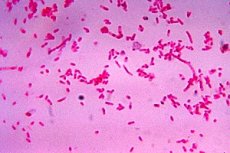
Scientists have discovered one of the variations of fusobacteria - Fusobacterium nucleatum - in every second colorectal tumor. This microorganism is quite common in the human body and is present in the oral cavity of healthy people. Now, a certain type of this bacterium is associated with increased risks of tumor recurrence and metastasis, as well as with an unfavorable prognosis for post-therapy survival. These results were announced by representatives of the American F. Hutchinson Oncology Center.
Colorectal cancer is considered a very common malignant pathology affecting the colon or rectum. Among the most common clinical symptoms, the leading ones are intestinal dysfunction and the appearance of blood in the stool. The diagnosis is based on information obtained during a colonoscopy. The main method of treatment is surgery to resection the affected intestinal segment followed by chemotherapy. The disease most often affects older people - fifty years of age and older.
Colorectal cancer is the second leading cause of death among adult patients (data for the United States from the American Society of Oncology).
Using the metagenomic sequencing method, experts identified colonies of the bacteria Fusobacterium nucleatum in foci of colorectal cancer. Interestingly, these microorganisms are normally present in the intraoral microflora.
Researchers studied colorectal tumor tissues removed from two hundred operated patients, while simultaneously measuring the presence of fusobacteria in them. As a result, the phenotypic and genetic heterogeneity of these microorganisms was revealed. It turned out that fusobacteria are divided into two types: C1, which live in the oral cavity, and C2, which predominate in the tissues of colorectal malignant neoplasms.
Category C2 bacteria was found in almost every second colorectal cancer sample. In addition, a large number of such microorganisms were sown in the stool of patients with this disease. This phenomenon was closely associated with increased dynamics of growth of the malignant focus, early re-development of the tumor and the formation of metastases, as well as unpromising therapeutic prognosis.
According to experts, identifying different types of fusobacteria and determining whether one of the types is involved in the development of colorectal cancer plays an important role in the early detection of this pathology. In addition, there are now chances to improve existing therapeutic measures using modifications of microorganisms for the purpose of transporting medicinal substances directly into the neoplasm tissue.
Details about the study are presented on the Nature
page

